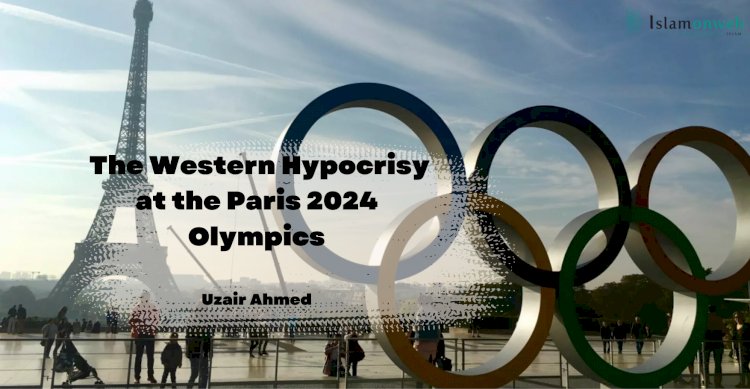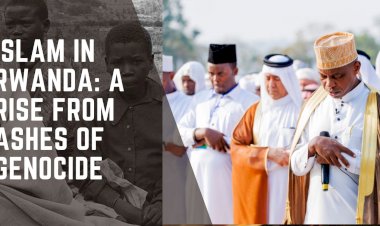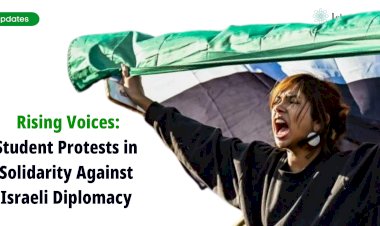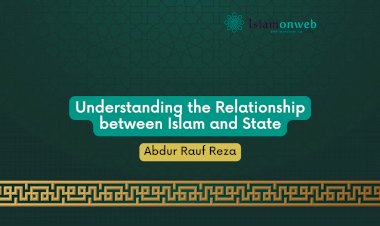Beyond the Games: The Western Hypocrisy at the Paris 2024 Olympics
Historically, the actions of European or Western nations have been marked by deep-rooted animosity towards Eastern or non-European states, a sentiment that dates back to the era of colonialism and imperialism. During these periods, Western powers justified colonisation and dominance by portraying themselves as the harbingers of modernity and progress. They positioned themselves as the "civilised" and "superior," while branding the colonised as "inferior," "backward," and "barbaric." Edward Said's seminal work, "Orientalism," along with numerous postcolonial and decolonial studies, has extensively dissected and critiqued these attitudes, revealing how such perceptions were constructed to sustain power dynamics and justify oppression.
What is most disheartening in the contemporary context is that this colonial mindset, underpinned by a sense of superiority and hatred towards the "other," continues to persist. Today, Western nations often present themselves as paragons of liberalism, modernity, progress, and democracy. However, this image frequently conceals stark hypocrisy, which was glaringly exposed during the 2024 Summer Olympics, held from July 26 to August 11 in Paris, France. The event, intended to celebrate international unity and athletic prowess, instead sparked a wave of controversies and concerns, casting a harsh spotlight on Western hypocrisy and discriminatory actions against other nations.
Several incidents during the Olympics underscored this hypocrisy, including violations of human rights and episodes of sexual exploitation, which betrayed the supposed values of equality and respect. Moreover, numerous instances hurt religious sentiments, most notably reflecting Islamophobia and anti-Muslim rhetoric. Racist remarks and behaviours were reported, and there were accusations of promoting ideologies that are aligned with terrorism and genocide, as well as propagating white supremacist rhetoric and prejudices on a global stage.
Controversial Opening Ceremony: A Clash of Art and Religious Sensitivities
The opening ceremony of the Paris 2024 Olympics, held on a bridge over the River Seine, has been widely criticised and has sparked significant controversy around the globe. The ceremony's performance was perceived by many as provocative and offensive, particularly among religious communities, who felt that it crossed the boundaries of respect and decency.
The tableau featured during the inaugural event included a woman with a large headdress, drag queens, and a nearly naked man, which many saw as a mockery of a biblical scene and a reinterpretation of Leonardo da Vinci’s "The Last Supper." "The Last Supper," a famous mural by Leonardo da Vinci, depicts Jesus sharing his final meal with his Twelve Apostles before his crucifixion, as narrated in the Gospel of John. The inclusion of a transgender model, a near-naked Greek god of wine, and a woman who proudly identified as Jewish, fat, and lesbian in the ceremony's performance was seen by many as a deliberate parody of this sacred moment, leading to widespread outrage.
Religious leaders and communities worldwide viewed the performance as a disrespectful and blasphemous mimicry of Christianity. The French Catholic Church responded with strong condemnation, perceiving the portrayal as an offensive parody of "The Last Supper" and an attack on their religious beliefs. Christian conservatives in Europe and America, alongside their Muslim counterparts globally, shared similar sentiments, labelling the performance as "blasphemous" and "an abomination." The controversy spurred calls for boycotts and drew criticism from various regions, including Latin America and the Middle East, highlighting the widespread discontent over the portrayal.
In India, Bollywood actor turned-politician Kangana Ranaut voiced her strong disapproval of the opening ceremony through a series of Instagram stories. She criticised the ceremony for what she saw as an unnecessary association of the Olympics with sexual expression, accusing "leftists of totally hijacking the Olympics 2024." Ranaut, who is also a BJP MP from Mandi, Himachal Pradesh, shared a screenshot of French singer Philippe Katerine’s performance and posed a critical question to the French government: “Is this how France welcomed the world for the 2024 Olympics? What is the message of such acts? Welcome to the world of Satan? Is this what they want to show?”
Politicisation of Sports and Western Hypocrisy
The Paris 2024 Olympics starkly revealed the extent of Western hypocrisy, particularly regarding the decision to permit Israeli participation despite its ongoing war on Gaza, which resulted in over 40,000 deaths. This decision was made despite widespread international calls to ban Israel from the games. While not every country has been granted such leniency in the past, Israel was allowed to participate, seemingly honoured by what some describe as Western double standards. This brings into sharp focus the politicisation of sports: why did the International Olympic Committee (IOC) provide a platform to an apartheid regime, allowing it to present itself as a "normal country" within the international community? More controversially, why was Russia banned but not Israel? This raises further questions about whether Palestinian lives are deemed less valuable than Ukrainian lives in the eyes of the international community.
Historically, the IOC has maintained a record of banning countries that engage in actions contrary to the spirit of the games. Thirteen nations have been excluded from the Olympics for reasons ranging from war and political stances to violations of IOC rules. In 2024, the exclusion of Russia and Belarus from the Olympics due to their roles in the Ukraine conflict further highlighted this inconsistency. Despite global demands for Israel’s exclusion over its actions in Gaza and human rights abuses in Occupied Palestine, the IOC’s decision to allow Israel’s participation only underscored what many see as a blatant endorsement of Israeli policies and an apartheid regime. This perceived bias was emphasised by South Africa's accusation of genocide against Israel at the International Court of Justice. Yet, Israel remained unbanned, unlike other nations accused of far lesser offences.
Throughout the history of the Olympic Games, several countries have faced bans for various reasons. The first significant ban occurred at the 1920 Summer Olympics in Belgium, where Germany, Austria, Hungary, Bulgaria, and Turkey were excluded due to their involvement in World War I. Germany continued to face a ban in the 1924 Paris Olympics, further extending the punishment for its wartime role. Similarly, in the 1948 Summer Olympics in London, both Germany and Japan were banned as a consequence of their roles in World War II. South Africa faced exclusion from the Olympic Games from 1964 to 1992 due to its apartheid policies. In 1972, Rhodesia (now Zimbabwe) was banned from the Munich Games due to international pressure over its racial segregation policies.
More recent examples include Afghanistan's ban from the 2000 Sydney Games due to the Taliban's stance on women's rights and Kuwait's suspension in 2015 due to government interference, which led to Kuwaiti athletes competing as independent Olympic athletes under the Olympic flag in the 2016 Rio de Janeiro Games. North Korea was banned from the 2022 Beijing Winter Games for its withdrawal from the 2020 Tokyo Olympics, a move that violated the Olympic Charter. Meanwhile, Russia faced partial bans from the 2016 Rio Olympics, continuing into the 2018 Winter Olympics and the 2020 Tokyo Summer Olympics due to state-sponsored doping. In 2024, Russia and Belarus were banned from the Paris Games due to their involvement in the Ukraine war; however, the IOC allowed a limited number of athletes from these countries to compete as "Individual Neutral Athletes" (ANIs).
Double Standards in Sports: The Controversy of Israeli Participation
One of the most heart-wrenching aspects of the Paris 2024 Olympics was not merely the participation of Israel as a nation but the fact that some Israeli athletes—many of whom are former soldiers who have openly expressed support for the ongoing Gaza conflict—were allowed to compete without any repercussions. This stands in stark contrast to the treatment of other athletes, such as Algerian judoka Messaoud Dris, who was disqualified for refusing to compete against Israeli judoka Tohar Butbul. This incident is not isolated; at the 2020 Tokyo Olympics, Algerian judoka Fethi Nourine faced a ten-year suspension by the International Judo Federation for refusing to compete against an Israeli opponent, stating, "We have worked hard to reach the Olympics, but the Palestinian cause is bigger than all this."
These examples highlight the blatant hypocrisy in the IOC and the West's stance on political neutrality in sports. It is evident that sports are far from apolitical today; repressive regimes often use them as a tool to sanitise their image and distract from their human rights abuses. By allowing Israel to participate in the Paris Olympics, the IOC provided a global platform for the regime to legitimise its actions in Gaza and normalise its apartheid policies.
Israel's apartheid regime has consistently denied Palestinians the right to participate in sports, resorting to extreme measures such as killing athletes, destroying sports facilities, and preventing teams from competing internationally. Since the beginning of the Gaza war, over 300 Palestinian athletes have been killed, at least 50 sports facilities have been destroyed, and one of Palestine's oldest stadiums has been repurposed as a concentration camp. These actions are a direct violation of one of the Olympic Charter's core principles: the belief that the practice of sport is a fundamental human right.
This situation exposes the stark hypocrisy of the West, which appears to turn a blind eye to the actions of the Israeli regime while continuing to support its military endeavours. The West's complicity is not surprising, considering its historical and ongoing support for Israel, including supplying weapons and funding for their operations against Palestinians. This support has persisted since the conflict's inception, highlighting a troubling inconsistency in how the West and international organisations like the IOC apply their principles and regulations. It also underscores the broader issue of how political and economic interests often overshadow genuine commitment to human rights and fairness in international arenas, including sports.
White Supremacy and Islamophobia: The West’s Double Standards
The Paris 2024 Olympics further highlighted the West's hypocrisy and Islamophobic tendencies. While the International Olympic Committee (IOC) allowed Israel to participate in the games, it simultaneously barred Muslim athletes wearing hijabs from competing. This hijab ban, enforced by France during the Olympics, starkly revealed the discriminatory double standards upheld by both the West and the IOC. Amnesty International has criticised this ban, noting that it violates international human rights laws and exposes the French authorities' discriminatory practices and the IOC's lack of resolve. The exclusion of French women athletes who wear headscarves undermines global efforts to make sports more inclusive and perpetuates discrimination against Muslim players and athletes in France.
The impact of France's exclusionary bans extends beyond the sports field, causing humiliation, trauma, and fear among affected women and girls. Many have been compelled to abandon the sports they love or seek opportunities in other countries where they can compete freely. Under international law, concepts such as state neutrality or secularism do not provide legitimate grounds for restricting freedom of expression and religion. However, for years, French authorities have weaponised these concepts to justify laws and policies that disproportionately affect Muslim women and girls, further entrenching discrimination under the guise of secularism.
Imane Khelif: Gender Identity and Media Bias
Another controversy erupted at the Paris 2024 Olympics when Algerian boxer Imane Khelif's participation in a quarterfinal event ignited a media storm fueled mainly by Western-dominated outlets. The uproar began after Khelif faced off against Italian boxer Angela Carini, delivering a powerful punch that resulted in Carini abandoning the match just 46 seconds in, citing a broken nose. However, the real point of contention revolved around Khelif's gender identity due to her XY chromosomes, typically found in males. This sparked widespread speculation and accusations that Khelif was either male or transgender.
The fact that an Arab woman decisively defeated a European boxer, challenging longstanding imperialist attitudes and shattering European egos, only intensified the scrutiny of Khelif's gender identity. The controversy prompted high-profile figures, including Harry Potter author J.K. Rowling, former U.S. President Donald Trump, Italian far-right Prime Minister Giorgia Meloni, and billionaire Elon Musk, to publicly project their ideological stances onto Khelif's situation.
J.K. Rowling, known for her vocal opposition to trans women in sports, described the event as "the smirking pleasure of a male beating up a woman and shattering her dreams," using Khelif's case to further her views under the guise of protecting women. Elon Musk echoed these sentiments, responding to a post by sports celebrity host Riley Gaines, who said, "Men don’t belong in women’s sports #IStandWithAngelaCarini," with a firm "Absolutely." Italian PM Giorgia Meloni tweeted her belief that "athletes who have male genetic characteristics should not be admitted to women's competitions." After meeting Carini, Meloni posted a photo of herself consoling the boxer, writing, "I know that you won't give up, Angela, and I know that one day you will get what you deserve through strength and sweat. In a competition that is finally equal." Donald Trump also weighed in, declaring in capital letters on his Truth Social platform, "I will keep men out of women's sports."
The roots of this controversy date back to 2023 when Khelif and Taiwanese boxer Lin Yu-ting were banned from competing in the International Boxing Association’s (IBA) World Championship in New Delhi because they did not "meet the gender eligibility criteria to compete within female categories." The IBA’s gender eligibility test differed from that of the International Olympic Committee (IOC), which allowed Khelif to compete in the 2024 Olympics. The IOC clarified that all boxers in the Olympics had adhered to the "competition’s eligibility and entry regulations." Khelif and Lin had also competed in the Tokyo 2020 Olympics without incident, and Khelif had previously lost multiple matches in the female category without her gender being questioned. It was only when a European boxer was defeated by an Arab woman in a swift 46-second match that the controversy erupted, exposing the underlying hypocrisy and biases at play.
Conclusion
International events like the Olympics, World Cups, and FIFA are meant to unite people from all corners of the globe, fostering a spirit of togetherness and sending a powerful message of love and peace. However, the Paris 2024 Olympics failed to embody these ideals, revealing a series of biased decisions that reinforced Western power and authority. Rather than serving as a platform for global harmony, the event highlighted deep-seated prejudices and the persistence of a colonial mindset.
Despite formally achieving independence from colonial powers and dismantling the overt structures of colonisation, the remnants of these oppressive systems remain embedded in global institutions. From India to Palestine, we see the hypocrisy of white supremacist ideologies dominating the international stage. The actions of Western nations at events like the Olympics expose their double standards: professing to defend human rights while simultaneously supporting genocide and oppression.
Our struggle against the residual influence of colonisers, as well as the so-called white liberals and progressives who perpetuate these injustices, must continue on all fronts. It is crucial to protect the freedom, justice, and equality of innocent Palestinians and to expose the West's duplicity to the world. Only by challenging these deep-rooted biases and calling out hypocrisy can we hope to achieve a truly inclusive and equitable global community.
References
- Julie Bindel, “Paris Olympics opening ceremony was an insult to millions”, Al-Jazeera, July 29, 2024.
- “Netizens furious over Paris Olympics opening ceremony: ‘Disrespectful, garbage’, Hindustan Times, 27 July, 2024.
- “Outcry over disgusting & disrespectful acts in Paris Olympics opening ceremony”, Times of India, July 27, 2024.
- Samantha Olson, “What We Know About The Last Supper Controversy at the 2024 Paris Olympics”, Cosmopolitan, 29 July, 2024
- Hanna Duggal, “which countries have been banned from participating in the Olympics”, Al-Jazeera, 29 July, 2024.
- Dave Zirin and Jules Boykoff, “Israel’s Olympics presence helps legitimise war crimes”, The Nation, 29 July, 2024.
- “Excellence, respect friendship: why hijab bans in French sports defy Olympics values and human rights” Amnesty International, 16 July, 2024.
- “Hijab bans, the Olympics and Islamophobia in sports”, Council on American-Islamic Relations, August 8, 2024.
- Anurag Bohra, “Like a man beats a woman, Kangana Ranaut natural male boxer”, Hindustan Times, 1 August, 2024.
- Ruby Hamad, “Imane Khelif and western delusions of white innocence”, Al-Jazeera, 7 August, 2024.
- Sahil Bakshi, “Who is Imane Khelif? The Algerian boxer at centre of Gender controversy in Paris Olympics” NDTV, SP, August 2, 2024.
About the author:
Uzair Ahmed is a PG Research Scholar in the Department of Civilizational Studies at Darul Huda Islamic University and a Political Science Student from IGNOU. Uzair Ahmed writes on Contemporary Islam, Indian Muslims, Socio-political issues in India, International Relations and South Asian Studies.
Disclaimer
The views expressed in this article are the author’s own and do not necessarily mirror Islamonweb’s editorial stance.

























Leave A Comment